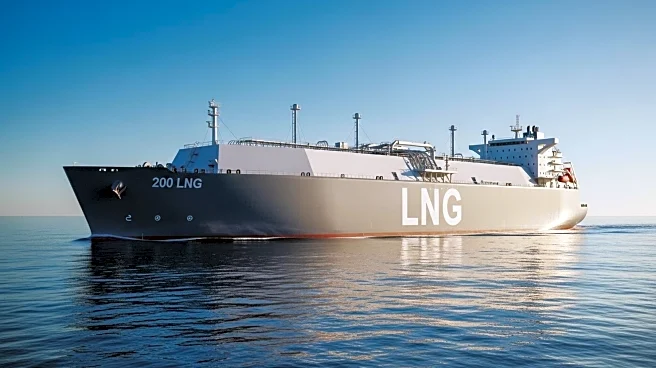What's Happening?
Rystad Energy, an independent research and energy intelligence firm, has published a comprehensive study on the greenhouse gas (GHG) emissions from the LNG bunker supply chain. Commissioned by SEA-LNG, the study provides the most accurate and up-to-date certified data on LNG as a marine fuel. The findings are intended to guide the International Maritime Organization’s (IMO) Net-Zero Framework and future fuel policy. The study highlights the emissions from five key lifecycle stages: upstream, transportation & processing, liquefaction, shipping, and distribution & bunkering operations. It reveals that the global well-to-tank emissions intensity for LNG bunkering fuel in 2024 is 13.9g CO2e/MJ, with carbon dioxide accounting for 84% of emissions. The study emphasizes the need for policy makers to incentivize reductions in GHG emissions, particularly in natural gas production and liquefaction, and to update emissions factors used in regulations.
Why It's Important?
The study's findings are crucial for shaping effective regulations and guiding future investment decisions in the maritime industry. As the sector transitions towards net-zero emissions, understanding the real-world lifecycle emissions of LNG is vital. With LNG representing a leading alternative to oil-based marine fuels, accounting for nearly 20% of the vessel orderbook, the study underscores the importance of accurate emissions data. Policymakers are urged to create regulations that reflect the true carbon intensity of marine fuels, rewarding reductions across the supply chain. This could lead to significant environmental benefits and drive technological advancements in emissions reduction, particularly in methane mitigation and liquefaction efficiency.
What's Next?
The study suggests that future decarbonization efforts should focus on upstream gas production and liquefaction, which are responsible for the majority of emissions in the LNG bunker supply chain. Policymakers are expected to consider these findings when developing regulations to decarbonize shipping. The report calls for the IMO to demand high standards for alternative fuel emissions and performance within the Net-Zero Framework. As the industry prepares for a rapidly expanding fleet of LNG-fueled vessels, the study's data will be instrumental in shaping future policies and investments.
Beyond the Headlines
The study highlights the regional variations in emissions intensities, which can differ by as much as 6.6 g CO2e/MJ. This variation reflects differences in gas sources, liquefaction technologies, and shipping distances, indicating that a single global average may not capture the full picture. The report advocates for regulations based on real and recent data to avoid undermining progress in LNG decarbonization. This approach could lead to more tailored and effective policies that address specific regional and technological contexts.











